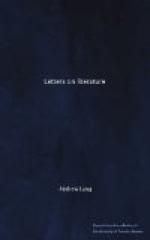RICHARDSON
By Mrs. Andrew Lang.
Dear Miss Somerville,—I was much interested in your fruitless struggle to read “Sir Charles Grandison,”—the book whose separate numbers were awaited with such impatience by Richardson’s endless lady friends and correspondents, and even by the rakish world—even by Colley Cibber himself. I sympathize entirely with your estimate of its dulness; yet, dull as it is, it is worth wading through to understand the kind of literature which could flutter the dove-cotes of the last century in a generation earlier than the one that was moved to tears by the wearisome dramas of Hannah More.
There is only one character in the whole of “Sir Charles Grandison” where Richardson is in the least like himself—in the least like the Richardson of “Pamela” and “Clarissa.” This character is Miss Charlotte Grandison, the sister of Sir Charles, and later (after many vicissitudes) the wife of Lord G. Miss Grandison’s conduct falls infinitely beneath the high standard attained to by the rest of Sir Charles’s chosen friends. She is petulant and loves to tease; is uncertain of what she wants; she is lively and sarcastic, and, worse than all, abandons the rounded periods of her brother and Miss Byron for free, not to say slang, expressions. “Hang ceremony!” she often exclaims, with much reason, while “What a deuce!” is her favourite expletive.
The conscientious reader heaves a sigh of relief when this young lady and her many indiscretions appear on the scene; when Miss Grandison, like Nature, “takes the pen from Richardson and writes for him.” But I gather that you, my dear Miss Somerville, never got far enough to make her acquaintance, and therefore are still ignorant of the singular qualities of her brother, Sir Charles—Richardson’s idea of a perfect man, for both brother and sister are introduced at almost the same moment.
Now it is nearly as difficult to realize that Sir Charles is a young man of twenty-six, as it is to feel that his antithesis, the adorable Pepys of the “Diary,” was of that precise age. Sir Charles might be borne with good-naturedly for a short time as an old gentleman who had become garrulous from want of contradiction, but in any other aspect he would be shunned conscientiously. Yet Richardson is not content with putting into his mouth lengthy discourses tending chiefly, though expressed with mock humility, to his own glorification; but he keeps all the other characters perpetually dancing round the Baronet in a chorus of praise. “Was there ever such a man, my Harriet, so good, so just, so noble in his sentiments?” “Ah, my Lucy, dare I hope for the affection of the best of men?” Some people would have begged their friends to cease making them ridiculous, but not so Sir Charles.




